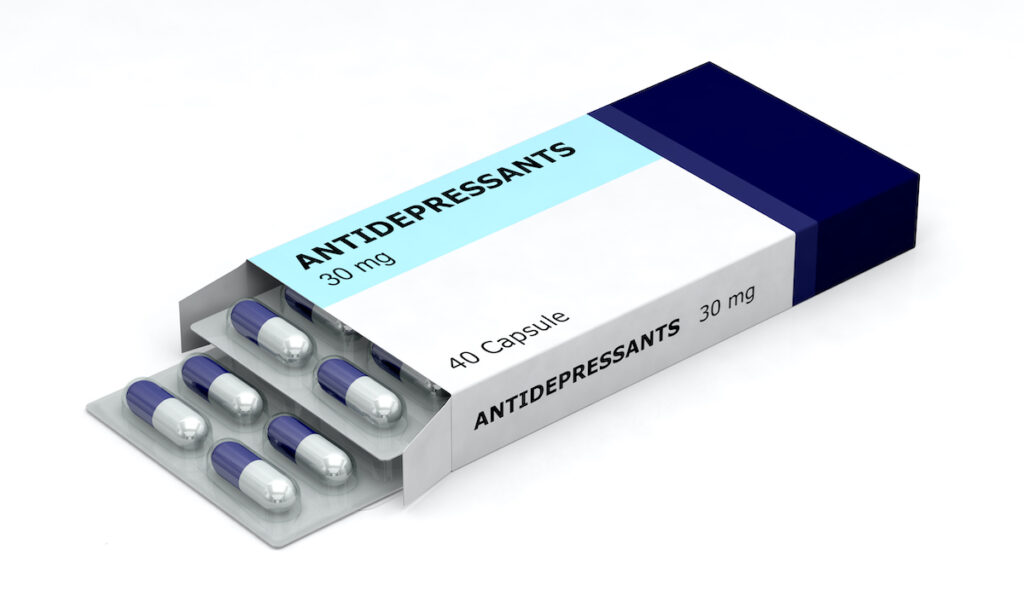
More than 300 million people around the world are suffering from depression at any one time (WHO., 2022), and we know it causes significant disability and difficulties functioning in daily life for those affected (Malhi & Mann, 2018). One reason for this is that over 50% of those with depression also have problems with cognition (i.e. reduced attention and concentration, executive function, motivation, learning and memory, and also difficulties in terms of processing information and understanding the value of rewards) (Halahakoon, Lewis & Roiser, 2019).
Our first-line antidepressant treatments, selective serotonin reuptake inhibitors (SSRIs) have been associated with emotional ‘blunting’ as a potential side effect (Price, Cole & Goodwin, 2009; Marazziti et al., 2019). That is the experience of having a reduced emotional response to positive and negative occurrences in your environment. We think that this may occur because people have problems with processing and appreciating rewards (related to the symptom of “anhedonia”), but it has been hard to tease apart the relative contributions of any medication versus depression itself in terms of the cause. That is because people with depression view the world through a more ‘negative’ lens than those without the illness (Harmer et al., 2009).
A 2018 blog written by Linda Gask concluded: “We can’t be sure from this evidence whether emotional blunting is being caused by the antidepressants, the depression itself, or something else entirely.”
Processing of rewards can be broken down into liking and wanting rewards, and learning about rewards including adjusting our responses in line with correct and incorrect anticipations of reward (i.e. appropriate reinforcement and prediction errors) (Berridge & Kringelbach, 2015). In terms of short courses on SSRIs and their effects on reward processing, the current picture is complicated. Healthy participants receiving a week of an SSRI appear to have reduced neural and behavioural processing of rewarding stimuli (McCabe et al., 2010; Michely et al., 2022), and deficits in probabilistic learning (where we have to balance a changing environment of rewards and punishments and learn to make the best choice) (Chamberlain et al., 2006; Skandali et al., 2018). However, slightly confusingly, it’s uncertain whether SSRIs improve or worsen aversive learning (where participants have to learn about punishment or reduced reward) (McCabe et al., 2010; Michely et al., 2022), and they are also associated with potential benefits for reward processing including improved brain signalling for prediction errors (Scholl et al., 2017) and improved memory recall (Harmer et al., 2002). We also have little data on the longer-term use of antidepressants and the impact on reward, which is problematic as many people taking antidepressants therapeutically receive them for many months or years.
The authors of a new Danish trial (Langley et al, 2023) wished to examine the effect of at least 3 weeks administration of an SSRI, escitalopram, on healthy volunteers in terms of various cognitive paradigms (including reward). Their stated hypothesis was that, compared to placebo, SSRI treatment in participants without depression would affect various aspects of reward processing, including reinforcement behaviour, probabilistic learning (specifically reversal learning) and response inhibition.

The study explored the chronic effects of the SSRI, escitalopram, on cognition among healthy volunteers.
Methods
The authors randomised healthy volunteers (18 to 45 years) in a double-blind manner to either 20mg escitalopram or placebo for at least 21 days (medication was given up to five weeks). These groups were balanced for age, sex and IQ and screened for medical and psychiatric illness. Adherence to medication was checked with serum escitalopram levels. The study was pre-registered on clinialtrials.gov, where investigators upload statistical plans prior to analysis.
All participants completed self-report questionnaires for mood, anxiety and personality traits. They also completed neurocognitive tests at baseline and after at least 21 days of medication. These were a broad range from the CANTAB battery including learning and memory, executive function, attention, decision-making, reinforcement behaviours (often called more “cold” cognition), and social cognition and emotion recognition (often termed “hot” cognition). The tasks focussed on reinforcement learning were: (i) sequential model-based model-free task (MBMF) (which does not address aversive learning) and (ii) the probabilistic reversal learning task (PRL) (which analyses responses to reward and punishment). All participants also undertook an MRI scan, but these analyses are reported elsewhere.
All analyses were conducted using the open source platform R, with questionnaires analysed using two-tailed t-tests and neurocognitive tests with linear regression models (with factors that may affect cognition such as age, IQ and baseline reaction time included as covariates). Analysis of both questionnaire and neurocognitive data included correction for multiple comparisons, but the authors state that the p values reported are uncorrected. The PRL was also analysed using a computational modelling approach (Bayesian reinforcement learning to trial-by-trial data) which had previously been published (most recently in Kanen et al., 2022) and appeared more sensitive to measure change than traditional analytic methods.
Results
73 healthy volunteers were randomised, but five (four from the escitalopram group) withdrew due to reported side effects (although more details are not given), a further two could not tolerate the MRI, and one had a serious abnormality (severe atrophy) detected at scanning. Therefore, 66 healthy volunteers were included in the analysis (placebo:escitalopram = 34:32). The mean duration of escitalopram administration was 26.1 days overall in the escitalopram (SD=2.78 days) and placebo (SD=3.29 days) groups. Groups were similar at baseline in terms of demographics and general processing speed. There were also no differences in terms of baseline or follow-up anxiety, mood, or personality traits. However, interestingly 21+ days of escitalopram was associated with some aspects of sexual dysfunction; a known side effect in those receiving it for depression, but often difficult to tease apart from symptoms of depression itself.
The computational modelling was more sensitive for the probabilistic reversal learning task (PRL) task as here group-level differences emerged that were not present using traditional (linear regression) analysis. The authors found the escitalopram group had lower reinforcement sensitivity compared to the placebo group (mean difference = -2.77, 90% highest density interval -0.15 to 0.11). In other words, escitalopram participants appeared to be less able to control responses to the different options and ‘reinforce’ the most rewarding option. However, escitalopram versus placebo did not affect the reward or punishment learning rates (i.e. their ability to learn about the options themselves), or the stimulus stickiness parameter (i.e. the likelihood of repeating that choice, indicating that escitalopram wasn’t just making participants reluctant to change options generally).
This finding of reduced reinforcement sensitivity with escitalopram versus placebo was repeated using the MBMF task (a significantly reduced Reward × Group interaction estimated coefficient = −0.34, p < 0.01, 95% CI [−0.57 to −0.11]). That is, the escitalopram group was less likely to stick with a stimulus that gave a reward compared to the placebo group.
Escitalopram did not appear to affect other measures of “hot” or “cold” cognition as assessed by the CANTAB battery. The authors did note that a few participants had missing data for the “hot” cognition tasks due to time constraints (presumably these were performed last in the research visit).
It should also be noted that 53% of escitalopram participants correctly guessed their study allocation, whereas 15.6% of participants receiving placebo gave an incorrect guess (i.e. that they were receiving citalopram) – a significant difference (p=0.01).

Healthy volunteers who received escitalopram appeared to be less able to control responses to different options and reinforce the most rewarding one.
Conclusions
The authors interpret that finding reduced reinforcement sensitivity on two separate tasks with escitalopram confirms that serotonin is involved in reinforcement learning in healthy volunteers, and is likely supportive evidence of emotional blunting with SSRIs. This is because “reducing reinforcement sensitivity would suggest decreased control over behaviour by both rewarding and punishing stimuli”.
In a subsequent blog by some of the authors (The Conversation 2022), they state that in fact, this effect of emotional blunting may be a therapeutic action with SSRIs; reducing the impact of experiencing negative emotions. They also note that escitalopram had no effect on other measures of cognition; both those with and without an emotional valence.

The use of escitalopram for 26 days on average had no significant effect on any other measure of cognition in healthy individuals.
Strengths and limitations
It is of credit to the authors that they were able to undertake an assessment of cognition in volunteers who received over 21 days of escitalopram. The majority of studies assess participants between one day and two weeks, and although there is great value in these studies where we can use valid proxies, there is also a need for studies with a longer period of administration. These may help to understand what mechanisms may be at play in those who receive medication for a long period of time as per typical clinical practice, and neurochemically, assessing the effects of SSRIs at 3 weeks may be of particular relevance. It is believed that antidepressants lead to clinical improvement in low mood due to their ability to induce neuroplasticity (Duman, 2002), and the delay in clinical efficacy seen following SSRI initiation at least partly relates to the time taken (2-3 weeks) for this process to occur (Santarelli et al., 2003). Therefore, assessing the impact of SSRIs on behaviour at this point may be particularly clinically meaningful.
However, there are some limitations that require further discussion:
- Most participants (>80%) in the placebo group were aware that they were receiving placebo, and there is a possibility that this biased results.
- Unfortunately, one of the reinforcement learning tasks used cannot differentiate between reward and punishment (the MBMF), which limits the breadth of interpretation.
- For the computational modelling method with the PRL, previously other authors have used 95% as the highest density interval (aka the confidence interval; as per (Kanen et al., 2022) whereas here 90% was chosen without a detailed justification for this.
- Looking at the pre-registration record for the study, there are multiple primary outcomes, which often means we should correct for multiple comparisons (this analysis was done, but not used for the main report).
- There also is a possibility that the modelling here may be too sensitive (i.e.) we may be picking up noise rather than signal.
- 20mg of escitalopram is also a high dose for a healthy volunteer study, and it is possible that some emotional blunting may depend on the dose.

Around 80% in the placebo group were aware of receiving a placebo, hence we do not know how this has biased the findings.
Implications for practice
The important and good news from this study is that escitalopram (and presumably this is similar to other SSRIs) do not seem to be associated with impairments in most facets of cognition. This is extremely important for those with depression and cognitive impairment and confirms earlier evidence that they should not be worried that taking SSRIs may worsen their executive function, ability to learn and remember information, or speed of processing information.
At this point, what else do we need to demonstrate in terms of emotional blunting and antidepressants?
Firstly, the proof of the pudding, as with all science, will be the replication of these study findings. It is dissimilar to other recent evidence that emotional blunting does generally improve with antidepressant treatment (Peters, Balbuena and Lodhi, 2022).
If it does replicate, there are also questions that we also need to ask to fully understand the clinical impact of this study:
- Does this translate into those with depression, with and without accompanying problems with cognition?
- If so, how many people experience this effect? Is it dose-related (can we reduce severity with dose reduction if people experience it)?
- Is it “part of the process” or can we avoid blunting and still have therapeutic efficacy with a more selective drug (i.e.) does it occur outside of SSRIs?
At this point, I think it is important to state that these findings do not take away from the fact that antidepressants are clinically effective for many people. Therefore, although these results are interesting and require further exploration, it is important that people don’t discontinue a medication that is helping them without discussing it with their medical professional.

Further investigation into whether these findings are applicable to people with depression is needed to demonstrate the study’s clinical impact.
Statement of interests
None.
Links
Primary paper
Langley, C., Armand, S., Luo, Q., Savulich, G., Segerberg, T., Søndergaard, A., Pedersen, E. B., Svart, N., Overgaard-Hansen, O., Johansen, A., Borgsted, C., Cardinal, R. N., Robbins, T. W., Stenbæk, D. S., Knudsen, G. M. and Sahakian, B. J. (2023) ‘Chronic escitalopram in healthy volunteers has specific effects on reinforcement sensitivity: a double-blind, placebo-controlled semi-randomised study‘, Neuropsychopharmacology.
Other references
Berridge, K. C. and Kringelbach, M. L. (2015) ‘Pleasure systems in the brain‘, Neuron, 86(3), pp. 646-64.
Chamberlain, S. R., Müller, U., Blackwell, A. D., Clark, L., Robbins, T. W. and Sahakian, B. J. (2006) ‘Neurochemical Modulation of Response Inhibition and Probabilistic Learning in Humans‘, Science, 311(5762), pp. 861-863.
Duman, R. S. (2002) ‘Pathophysiology of depression: the concept of synaptic plasticity‘, Eur Psychiatry, 17 Suppl 3, pp. 306-10.
Halahakoon, D. C., Lewis, G. and Roiser, J. P. (2019) ‘Cognitive Impairment and Depression-Cause, Consequence, or Coincidence?‘, JAMA Psychiatry, 76(3), pp. 239-240.
Harmer, C. J., Bhagwagar, Z., Cowen, P. J. and Goodwin, G. M. (2002) ‘Acute administration of citalopram facilitates memory consolidation in healthy volunteers‘, Psychopharmacology, 163(1), pp. 106-110.
Harmer, C. J., O’Sullivan, U., Favaron, E., Massey-Chase, R., Ayres, R., Reinecke, A., Goodwin, G. M. and Cowen, P. J. (2009) ‘Effect of acute antidepressant administration on negative affective bias in depressed patients‘, Am J Psychiatry, 166(10), pp. 1178-84.
Kanen, J. W., Luo, Q., Rostami Kandroodi, M., Cardinal, R. N., Robbins, T. W., Nutt, D. J., Carhart-Harris, R. L. and den Ouden, H. E. M. (2022) ‘Effect of lysergic acid diethylamide (LSD) on reinforcement learning in humans‘, Psychological Medicine, pp. 1-12.
Malhi, G. S. and Mann, J. J. (2018) ‘Depression’, Lancet, 392(10161), pp. 2299-2312.
Marazziti, D., Mucci, F., Tripodi, B., Carbone, M. G., Muscarella, A., Falaschi, V. and Baroni, S. (2019) ‘Emotional Blunting, Cognitive Impairment, Bone Fractures, and Bleeding as Possible Side Effects of Long-Term Use of SSRIs‘, Clin Neuropsychiatry, 16(2), pp. 75-85.
McCabe, C., Mishor, Z., Cowen, P. J. and Harmer, C. J. (2010) ‘Diminished Neural Processing of Aversive and Rewarding Stimuli During Selective Serotonin Reuptake Inhibitor Treatment‘, Biological Psychiatry, 67(5), pp. 439-445.
Michely, J., Eldar, E., Erdman, A., Martin, I. M. and Dolan, R. J. (2022) ‘Serotonin modulates asymmetric learning from reward and punishment in healthy human volunteers‘, Communications Biology, 5(1), pp. 812.
Peters, E. M., Balbuena, L. and Lodhi, R. J. (2022) ‘Emotional blunting with bupropion and serotonin reuptake inhibitors in three randomized controlled trials for acute major depressive disorder‘, Journal of Affective Disorders, 318, pp. 29-32.
Price, J., Cole, V. and Goodwin, G. M. (2009) ‘Emotional side-effects of selective serotonin reuptake inhibitors: qualitative study‘, The British Journal of Psychiatry, 195(3), pp. 211-217.
Santarelli, L., Saxe, M., Gross, C., Surget, A., Battaglia, F., Dulawa, S., Weisstaub, N., Lee, J., Duman, R., Arancio, O., Belzung, C. and Hen, R. (2003) ‘Requirement of hippocampal neurogenesis for the behavioral effects of antidepressants‘, Science, 301(5634), pp. 805-9.
Scholl, J., Kolling, N., Nelissen, N., Browning, M., Rushworth, M. F. S. and Harmer, C. J. (2017) ‘Beyond negative valence: 2-week administration of a serotonergic antidepressant enhances both reward and effort learning signals‘, PLOS Biology, 15(2), pp. e2000756.
Skandali, N., Rowe, J. B., Voon, V., Deakin, J. B., Cardinal, R. N., Cormack, F., Passamonti, L., Bevan-Jones, W. R., Regenthal, R., Chamberlain, S. R., Robbins, T. W. and Sahakian, B. J. (2018) ‘Dissociable effects of acute SSRI (escitalopram) on executive, learning and emotional functions in healthy humans‘, Neuropsychopharmacology, 43(13), pp. 2645-2651.
WHO. (2022) World mental health report: transforming mental health for all.
